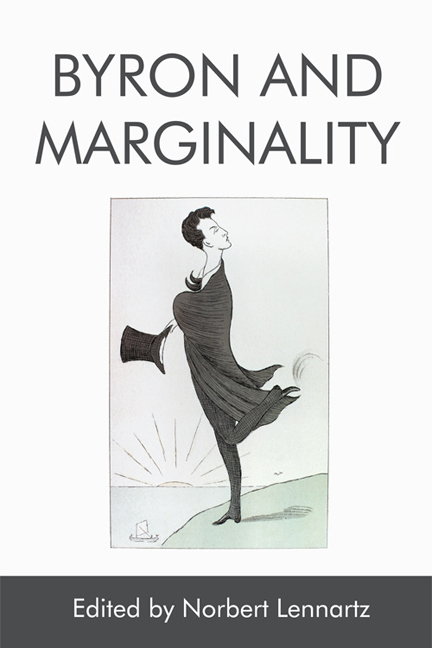Book contents
- Frontmatter
- Contents
- Foreword
- Acknowledgements
- Editions and Abbreviations
- 1 Lord Byron, Wandering and Wavering between the Centres and Margins of Romanticism: An Attempt at an Introduction
- I Byron’s Marginalisation in Romantic World Literature
- II Byron’s Marginal Identities and Places
- III Cherishing the Marginal – Marginal Genres in Byron
- IV On the Provocative Margins of Taste
- V Marginal Affairs – Visual and Paratextual Aspects in Byron
- List of Contributors
- Index
3 - Reshaping the Romantic Canon from the Margins: The Medial Construction of ‘Byron’ in Childe Harold’s Pilgrimage
Published online by Cambridge University Press: 06 May 2021
- Frontmatter
- Contents
- Foreword
- Acknowledgements
- Editions and Abbreviations
- 1 Lord Byron, Wandering and Wavering between the Centres and Margins of Romanticism: An Attempt at an Introduction
- I Byron’s Marginalisation in Romantic World Literature
- II Byron’s Marginal Identities and Places
- III Cherishing the Marginal – Marginal Genres in Byron
- IV On the Provocative Margins of Taste
- V Marginal Affairs – Visual and Paratextual Aspects in Byron
- List of Contributors
- Index
Summary
Introduction
It is safe to say that Lord Byron's works, as well as Lord Byron himself, are situated both at the centre and on the margins of British Romanticism. He is at once one of the most famous and most successful poets of the period and at the same time hardly ever treated with the same reverence as, for instance, Wordsworth or Keats. Whilst being one of the most widely read authors of his day, his aesthetics do not conform with typically Romantic ideals: they point to both a Neoclassical past and a modernist future, which turns him into a figure that is paradoxically both ubiquitous and oddly ephemeral, escaping a fixed definition. In this chapter, I will argue that this effect is the result of a medial self-construction of ‘Byron’ in Lord Byron's own works, securing his status within the Romantic literary canon, as well as establishing the emergence of his celebrity status.
The past three decades have witnessed a dramatic change in the perception of the Romantic canon. The changes in the wake of New Historicist and Gender-Theoretical approaches of the 1980s have led to a fundamental reorganisation of the Romantic canon. Around the turn of the millennium, however, scholars in turn began to question the premises of this general sea change and looked again at the formerly canonical authors. A 1999 conference, organised by the German Society for Romanticism and bearing the title Re-mapping Romanticism, investigated and already critically historicised the general revision of the literary canon. In the introduction to the edited collection of the same title, the conference's co-organiser, Christoph Bode, stated that ‘all too often the question of quality, of literary value, was shirked in canon debates’, arguing that ‘a serious debate about why they [hitherto neglected authors] should be included or not has not even begun’.
Within both the traditional canon and the more open approach to Romantic literary history, Lord Byron occupies a position that is hard to define. In the essay ‘Re-Mapping Romanticism: Lord Byron – Britain's First Anti-Romantic’, published in the same volume, Norbert Lennartz argues:
The necessity for – or should we say the futility of? – re-mapping this movement, of extending and re-evaluating the traditionally maledominated canon has nowadays been amply demonstrated by various eminent scholars such as Jerome J. McGann, Duncan Wu and Anne K. Mellor.
- Type
- Chapter
- Information
- Byron and Marginality , pp. 40 - 56Publisher: Edinburgh University PressPrint publication year: 2018



